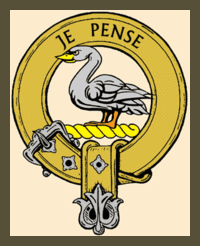

For thousands of years first (or given) names were the only designations people needed, as the world was much less crowded and every one knew their neighbors. Over time, it became increasingly difficult to distinguish individuals who lived relatively close to each other and possessed the same name.
While there are several different versions of when surnames were first given, it is generally agreed by most that the birth of the surname can be attributed to the Normans [the race, not the family]. In fact, the Domesday Book of 1086 (referred to in America as the Doomsday Book) was commissioned for the purpose of designating property ownership, thereby formalizing taxation, and is a fascinating study of early 11th century life and family heritage.
Shortly thereafter, surnames established themselves as part of the bearer's individuality; and as they were passed down from generation to generation, they became the symbol of a whole family and all that it stood for. As surnames were added to baptismal (or given) names, they began to make ones' identity more specific and helped distinguish family relationships.